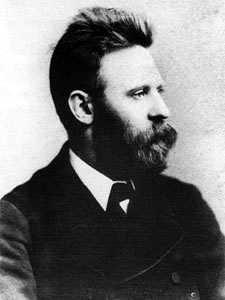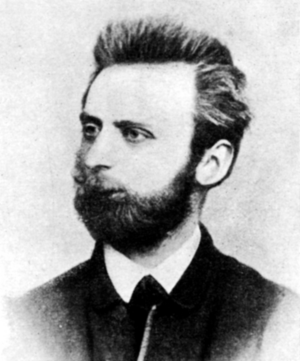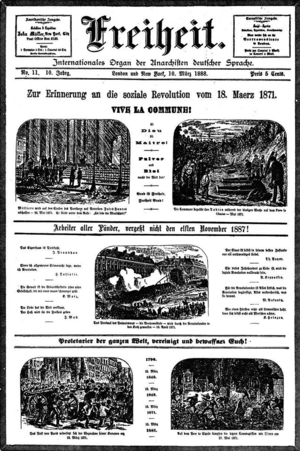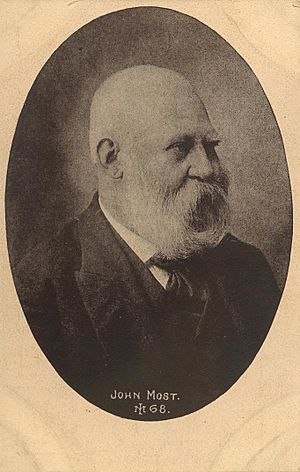Johann Most facts for kids
Quick facts for kids
Johann Most
|
|
|---|---|

Most circa 1890
|
|
| Born | March 17, 1846 Augsburg, Kingdom of Bavaria
|
| Died | March 17, 1906 (aged 60) Cincinnati, Ohio, US
|
| Occupation |
|
Johann Joseph "Hans" Most (February 5, 1846 – March 17, 1906) was a German-American politician, newspaper editor, and speaker. He first supported a political idea called Social Democracy, which aimed for a fairer society. Later, he became an anarchist, believing in a society without government.
Most is known for making the idea of "propaganda of the deed" popular. This meant taking strong actions to inspire change. His grandson was Johnny Most, a famous radio announcer for the Boston Celtics basketball team.
Contents
The Story of Johann Most
Early Life and Challenges
Johann Joseph Most was born in Augsburg, Bavaria. His mother was a governess and his father was a clerk. Johann's mother passed away when he was very young.
As a child, Most suffered from a severe illness on the left side of his face. Doctors had to remove a part of his jawbone. This left him with a permanent change to his appearance.
When he was twelve, Most led a student strike against a teacher they disliked. This led to him being expelled from school. His formal education ended, and he had to start working at a young age.
Most became an apprentice bookbinder. He worked long hours, which he later compared to slavery. At 17, he became a journeyman bookbinder. This meant he traveled and worked in many different cities and countries. He worked in 50 cities across 6 countries between 1863 and 1868. In Vienna, he was fired and put on a blacklist for organizing a strike. Because he couldn't find work as a bookbinder, he learned to make wooden boxes. He sold these boxes on the street until police stopped him for not having a license.
Becoming a Political Voice
In the late 1860s, Most became interested in international socialism. This was a new political movement growing in Germany and Austria. He believed that the ideas of Karl Marx and Ferdinand Lassalle could create a new, equal society. He became a strong supporter of Social Democracy, which was the name for the Marxist movement at the time.
Most worked as an editor for socialist newspapers in Chemnitz and Vienna. The authorities shut down both papers. He also worked for the Berliner Freie Presse (Berlin Free Press). Most strongly supported revolutionary socialism. He agreed with Wilhelm Liebknecht who said that "Socialism cannot be realized within the present state. Socialism must overturn the present state." This meant they believed the current government had to be completely changed for socialism to work.
In 1873, Most wrote a short version of Karl Marx's famous book, Das Kapital. Marx and Friedrich Engels helped correct it for a second edition.
In the 1874 German federal election, Most was elected to the Reichstag of the German Empire. He represented the Chemnitz Reichstag constituency as a member of the Social Democratic Workers' Party of Germany. He served there until 1878.
Most was arrested many times. This was because he spoke out against traditional ideas and the government. He also promoted strong actions, even violence, to bring about change. He wrote about his prison experiences in a book called Die Bastille am Plötzensee: Blätter aus meinem Gefängniss-Tagebuch (The Bastille on Plötzensee: Pages from my Prison Diary). He also wrote many songs for workers in his Proletarier-Liederbuch (Proletarian Songbook).
After suggesting violent actions, like using bombs, to create revolutionary change, Most was forced to leave Germany. He went to France but had to leave there too in late 1878. He then settled in London. There, he started his own newspaper called Freiheit (Freedom). The first issue came out on January 4, 1879. Most became convinced that working within the parliamentary system was useless. He began to support anarchism, which led to him being removed from the German Social Democratic Party in 1880.
In June 1881, Most wrote in Freiheit that he was happy about the killing of Alexander II of Russia. He suggested others should do the same. For this, British authorities put him in prison for a year and a half.
Life in the United States
Most heard about worker struggles and industrial problems in the United States. After being released from prison in 1882, he moved to the US. He quickly began to speak out among other German immigrants.
Most started publishing Freiheit again in New York. He was imprisoned in 1886, again in 1887, and in 1902. The last time was for two months. This was because he published an article after the killing of President McKinley. In the article, he argued that killing a ruler was not a crime.
Most once said, "Whoever looks at America will see: the ship is powered by stupidity, corruption, or prejudice."
Most first supported a type of anarchism where people work together. Later, he believed in anarchist communism, where resources are shared by everyone. Most was famous for explaining the idea of the Propaganda of the Deed (Attentat). He said, "The existing system will be quickest and most radically overthrown by the annihilation of its exponents. Therefore, massacres of the enemies of the people must be set in motion." This meant he believed that attacking those in power would quickly change the system. Most is best known for a pamphlet from 1885 called The Science of Revolutionary Warfare. This was a guide on how to make bombs, which earned him the nickname "Dynamost."
Most was a talented speaker. He spread his ideas to many Marxist and anarchist groups in the United States. He gained many followers, including famous anarchists like Emma Goldman and Alexander Berkman.
Inspired by Most's ideas, Emma Goldman and Alexander Berkman were very upset by the deaths of workers during the Homestead strike. Berkman tried to attack Henry Clay Frick, the manager of the Homestead factory, in 1892. However, Berkman and Goldman soon became disappointed with Most. Most became one of Berkman's biggest critics. In Freiheit, Most criticized both Goldman and Berkman. He suggested Berkman's action was meant to make people feel sorry for Frick. Goldman was furious and demanded Most prove his claims. When he refused, she confronted him at a lecture. He wouldn't speak to her, so she hit him with a horsewhip, broke it, and threw the pieces at him. She later regretted her actions.
Most was in Cincinnati, Ohio, to give a speech when he became ill. He was diagnosed with a skin infection called erysipelas. Doctors could not help him much, and he passed away a few days later.
See also
 In Spanish: Johann Most para niños
In Spanish: Johann Most para niños
 | Anna J. Cooper |
 | Mary McLeod Bethune |
 | Lillie Mae Bradford |




